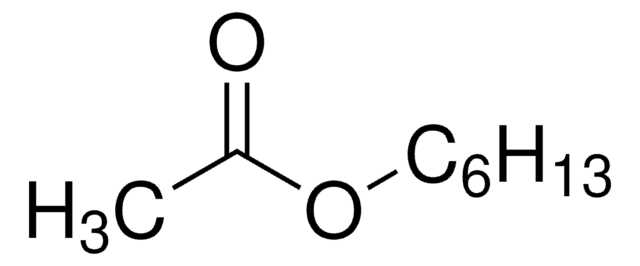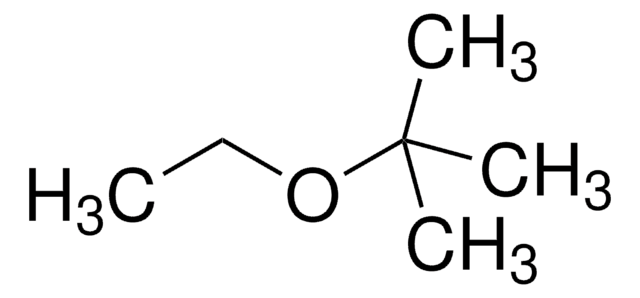All Photos(1)
About This Item
Linear Formula:
CH3(CH2)5O(CH2)5CH3
CAS Number:
Molecular Weight:
186.33
Beilstein:
1738177
EC Number:
MDL number:
UNSPSC Code:
12352100
PubChem Substance ID:
NACRES:
NA.22
Recommended Products
Quality Level
Assay
97%
refractive index
n20/D 1.4204 (lit.)
bp
228-229 °C (lit.)
density
0.793 g/mL at 25 °C (lit.)
SMILES string
CCCCCCOCCCCCC
InChI
1S/C12H26O/c1-3-5-7-9-11-13-12-10-8-6-4-2/h3-12H2,1-2H3
InChI key
BPIUIOXAFBGMNB-UHFFFAOYSA-N
Looking for similar products? Visit Product Comparison Guide
Related Categories
Application
Dihexyl ether has been used as:
- supported liquid membrane during hollow-fiber liquid-phase microextraction method for determination of nitrophenolic compounds from atmospheric aerosol particles
- an extraction solvent to detect avermectins in stream water by hollow-fiber-assisted liquid-phase microextraction technique coupled with LC-MS/MS
Signal Word
Warning
Hazard Statements
Precautionary Statements
Hazard Classifications
Aquatic Acute 1 - Aquatic Chronic 2 - Skin Sens. 1B
Storage Class Code
10 - Combustible liquids
WGK
WGK 2
Flash Point(F)
172.4 °F - closed cup
Flash Point(C)
78 °C - closed cup
Personal Protective Equipment
dust mask type N95 (US), Eyeshields, Gloves
Choose from one of the most recent versions:
Already Own This Product?
Find documentation for the products that you have recently purchased in the Document Library.
Customers Also Viewed
Mohammad Bazregar et al.
Journal of chromatography. A, 1429, 13-21 (2015-12-30)
A simple and efficient approach is introduced for the improvement of the clean-up and applicability of the dispersive liquid-liquid microextraction (DLLME) method in complicated matrices. For this purpose, two dispersive microextraction methods were combined, and the tandem dispersive liquid-liquid microextraction
María Ramos Payán et al.
Journal of chromatography. A, 1556, 29-36 (2018-05-08)
A new geometry for a versatile microfluidic-chip device based liquid phase microextraction was developed in order to enhance the preconcentration in microfluidic chips and also to enable double-flow and stopped-flow working modes. The microchip device was combined with a HPLC
María Ramos-Payan et al.
Talanta, 165, 496-501 (2017-02-06)
A fast double-flow microfluidic based liquid phase microextraction (DF-µLPME) combined with a HPLC-UV procedure using diode array detection has been developed for the determination of the four most widely used parabens: Ethyl 4-hydroxybenzoate (EtP), Propyl 4-hydroxybenzoate (PrP), Butyl 4-hydroxybenzoate (BuP)
Cristina Román-Hidalgo et al.
Talanta, 199, 290-295 (2019-04-07)
A chitosan membrane composed by 60% (w/w) chitosan and 40% (w/w) Aliquat®336 has been proposed as a new biopolymeric support for electromembrane extraction. The new support has been characterized by Scanning Electron Microscopy, resulting a 30-35 µm thickness. Amoxicillin, nicotinic acid
Peyman Moradi et al.
Journal of separation science, 42(4), 897-905 (2018-12-18)
A simple method is introduced providing a highly clean microextraction for the determination of some anti-inflammatory drugs as the model analytes in human urine and environmental matrices. This method is based upon the implementation of two consecutive emulsification liquid-phase microextractions
Our team of scientists has experience in all areas of research including Life Science, Material Science, Chemical Synthesis, Chromatography, Analytical and many others.
Contact Technical Service













